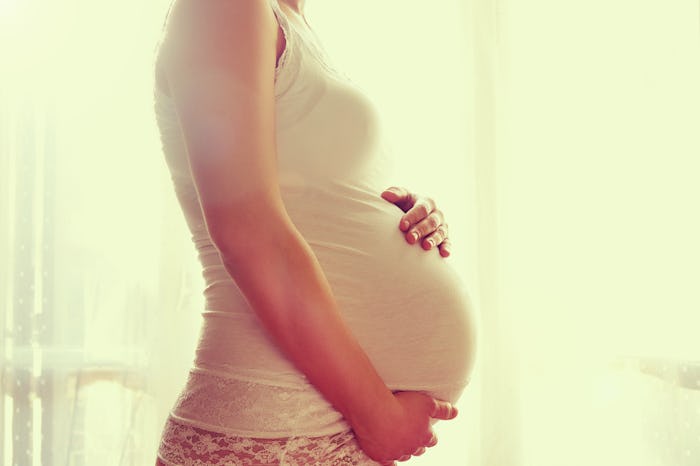When you're pregnant, that first OB-GYN visit can be daunting and lengthy. You’ll field numerous questions about your medical history, be poked and prodded a bit, and probably sit through a blood test and an ultrasound. Then, depending on your situation, you might end up hearing your doctor use the words “high-risk” to describe your pregnancy. It sounds scary and you'll probably have a million questions, but don’t worry. You're not alone. These are just some of the many thoughts everyone has when their pregnancy is high-risk.
Having a pregnancy labeled as "high risk" isn't necessarily or automatically a "bad" thing. Rather, it usually just means your OB-GYN and/or other care providers will need to keep a closer eye on you and your baby-to-be. Some factors can make your pregnancy more high-risk than others, too, so the term can mean multiple things for multiple pregnant women. While it's difficult to do (trust me, I know) the best thing you can do is stay calm. Most pregnant women who are labeled "high-risk" go on to have healthy, happy, thriving babies. You’ll just need to take extra precautions.
I was labeled "high-risk" during my second pregnancy, because I went into preterm labor during my first. I had weekly visits with my doctor, and was administered a series of hormone shots. Now I have a healthy, spirited 3-year-old son. I did have a ton of thoughts and questions when I first heard I was "high-risk," though. Let’s go over some of those, because while every situation truly is different, I bet they’re some of the same ones you may have.
"Why Am I High-Risk?"
There are a number of reasons why you might hear the words "high-risk" from your doctor. Having a preexisting condition, like high blood pressure or diabetes, being HIV-positive, having experienced a previous pregnancy loss or premature birth, being older or younger in maternal age, being overweight or obese, is one reason. If you're carrying multiples, as in twins or triplets, you're automatically labeled "high-risk," even if everything going on in your pregnancy is relatively "normal."
Your healthcare provider will certainly let you know exactly why you are going to be closely monitored during your pregnancy.
"Is My Baby Sick?"
Being high-risk does not automatically mean your baby-to-be is sick, or is going to be sick. However, it does mean your baby might have a greater risk to their overall health. It could mean they might be born prematurely (especially in cases of multiples, like twins), which would put them at risk for having any number of health issues at birth.
Like I said, every case is different.
"Is My Baby Going To Make It Full-Term?"
Unfortunately, there’s no real way of ever knowing whether your pregnancy will be full term or not. Not that it's necessarily comforting, but there are many women who weren't labeled high-risk when they were pregnant, who went into preterm labor anyway. Our bodies are mysterious, and sometimes things just happen.
If you’re high-risk because you’ve gone into preterm labor in the past, there’s definitely a higher chance this will be the case again. However, your doctors will basically be working to make sure this doesn’t happen, using every means necessary to prevent it.
"Is There A Chance My Baby Will Die?"
Being labeled high-risk is not a death sentence. Most high-risk pregnancies end with a healthy mother and a healthy baby (or babies).
That said, 6 of every 1000 babies succumb to infant mortality, some of which can be linked to high-risk pregnancy factors like preterm labor and premature birth, high blood pressure, obesity and weight gain, and gestational diabetes. So while there is no need to worry yourself sick, be being aware of the facts and make sure you get the proper care you need. That's one way to cut your risk factors down significantly.
"Will My Baby Have A Disability?"
Plenty of babies born from high-risk pregnancies do not have any disabilities. However, factors like older maternal age can put your fetus at a higher chance of being born with Down Syndrome or other chromosomal disorders, as well as autism. These are definitely important things to discuss with your doctor.
If this is the case with your baby, it doesn't mean your baby will live a horrible life (by any means, because that's ableist), it just means you'll probably have to adjust your future plans to accommodate your child.
"Did I Do Something To Make This Happen?"
No, no, and more no. In fact, all the damn no. You don’t make yourself have a high-risk pregnancy. Outside factors, usually completely out of your control, will determine whether you are high-risk or not.
Please do not feel guilty and please do not blame yourself.
"How Can I Protect My Baby?"
When you're high-risk, you and your doctor (or doctors) will come up with a plan in order to yield the best outcome for your pregnancy. For some, this might mean progesterone shots. For others, it might mean bed rest after you reach a certain gestation. By being open and honest with your doctor, and taking care of yourself, you will be doing all you can to protect that future bundle of joy.
"Will I Always Be Labeled High-Risk?"
Most likely. Most factors for high-risk pregnancy, like advanced maternal age, previous loss, and certain health conditions, tend not to go away. Therefore, you’ll still be high-risk in any future pregnancies you may or may not experience.
However, in cases like giving birth to multiples where you may have been able to carry nearly to term and had no other complications, your next pregnancy might not necessarily gravitate toward being high-risk. Regardless, high-risk is not a bad thing. It’s just a label that’s meant to give you extra care and protection to make sure you and your baby are safe. So don’t sweat it, you’re doing everything right.
